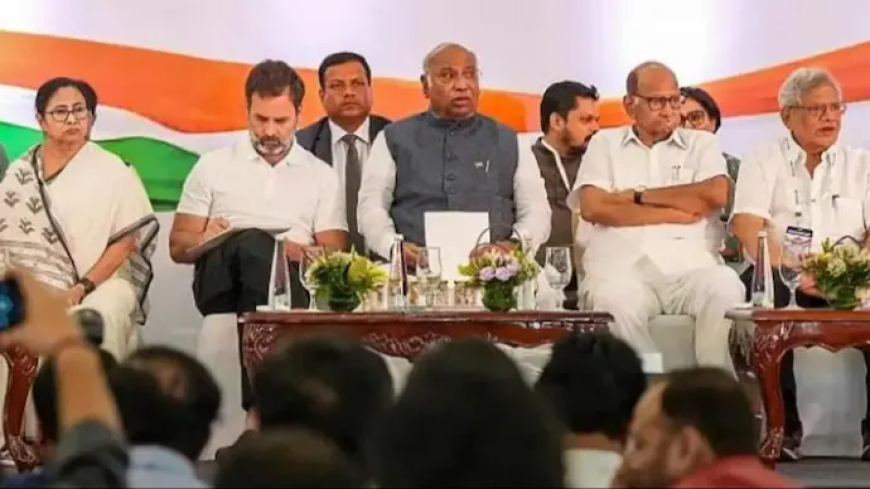NDIA Bloc Pushes for Special Parliament Session Amid Alleged EVM Irregularities and Democratic Concerns
Leaders of the INDIA alliance have formally demanded a special session of Parliament, citing pressing concerns over electoral transparency, EVM credibility, and democratic accountability.

New Delhi, June 3, 2025 — In a dramatic and politically charged move, the INDIA alliance—a coalition of major opposition parties—has formally demanded a special session of Parliament to discuss mounting concerns over the credibility of the electoral process, specifically citing irregularities in Electronic Voting Machines (EVMs) and issues related to democratic institutions' independence.
Leaders from the Congress, Trinamool Congress, Samajwadi Party, DMK, and AAP, among others, met in the capital and signed a joint memorandum addressed to President Droupadi Murmu and Lok Sabha Speaker Om Birla, insisting on urgent legislative scrutiny and national debate.
Why the INDIA Bloc Wants a Special Parliament Session
At the core of their demand lies what the opposition calls a “democratic emergency.” The leaders cited:
-
Inconsistencies in EVM vote counts and VVPAT matching.
-
Central agencies' alleged misuse during election campaigns.
-
Concerns over the neutrality of the Election Commission.
-
Suppression of media freedom, especially concerning independent election coverage.
“We are not questioning democracy; we are protecting it,” said Congress president Mallikarjun Kharge. “When institutions no longer act independently, Parliament must step in.”
This push comes just days after media reports highlighted discrepancies in EVM handling protocols in certain constituencies, including Bihar and Uttar Pradesh.
Key Demands Outlined by the INDIA Bloc
The INDIA alliance’s letter outlines five critical agenda items they want addressed in a special session:
-
Independent Audit of EVMs and VVPAT Slips
A proposal for a third-party audit mechanism has been floated to ensure vote-count transparency. The opposition is demanding real-time publication of VVPAT-EVM match statistics on the Election Commission’s official portal. -
Constitutional Review of Election Commission Reforms
Citing the 2023 Supreme Court ruling, the INDIA Bloc seeks to implement a non-partisan selection process for Election Commissioners. -
Protection of Federal Structure
States governed by opposition parties allege that the central government has deliberately withheld fiscal transfers and central schemes’ disbursements as a political tool. -
Restoration of Press Freedom and Journalistic Autonomy
The opposition calls for a review of recent amendments to the IT Rules and Press Freedom laws, which they argue curb dissent and media criticism. -
Discussion on the Role of Investigative Agencies
Parties have flagged the misuse of agencies like ED, CBI, and NIA against opposition leaders during the election cycle, demanding an oversight mechanism.
Trinamool, AAP, and DMK: Vocal Players in the Demand
Among the most vocal were Mamata Banerjee, Arvind Kejriwal, and M.K. Stalin, each accusing the Modi-led government of sidelining the democratic process in the name of national security and electoral dominance.
Mamata Banerjee, speaking at the press conference in Kolkata, stated,
“If Parliament can be called for a cricket victory celebration, why not to save the Constitution?”
The Aam Aadmi Party reiterated its support and echoed concerns first raised in 2024 about EVM vulnerabilities—issues which had gained traction after a whistleblower from the Electronics Corporation of India Limited (ECIL) released documents alleging inconsistencies in firmware.
Government Response and BJP Stand
The central government has not officially responded, but BJP spokesperson Sambit Patra called the INDIA Bloc’s actions “a desperate attempt to cover electoral defeat narratives.” He insisted that India's electoral system is “globally admired for its integrity.”
However, independent political analysts suggest otherwise. According to Dr. Ruchi Sharma, a political scientist at Ashoka University,
“A special session of Parliament is not unprecedented. Given the scale of opposition concerns and citizen anxiety, it would be democratic to convene one.”
What Happens Next?
According to parliamentary procedures, a special session can be convened either by the President on Cabinet advice or by the Lok Sabha Speaker in extraordinary situations. Though rare, such sessions have occurred before, including for the Goods and Services Tax (GST) rollout in 2017 and the revocation of Article 370 in 2019.
Legal experts suggest that while no constitutional obligation exists to accept the INDIA Bloc's request, public and political pressure could make non-action appear autocratic.
Meanwhile, civil society groups and constitutional watchdogs like PRS Legislative Research and Common Cause India have backed the idea, citing the need for urgent parliamentary discourse in light of democratic backsliding indicators.
Final Thoughts
The INDIA Bloc’s demand for a special Parliament session marks a crucial test of India's democratic institutions. It’s not just about EVMs or political vendettas—this is about public trust in governance.
Whether the session is convened or not, the conversation around electoral transparency, institutional integrity, and citizen rights is unlikely to fade. If anything, it’s gaining traction in ways that could shape India’s political landscape for years to come.



















































